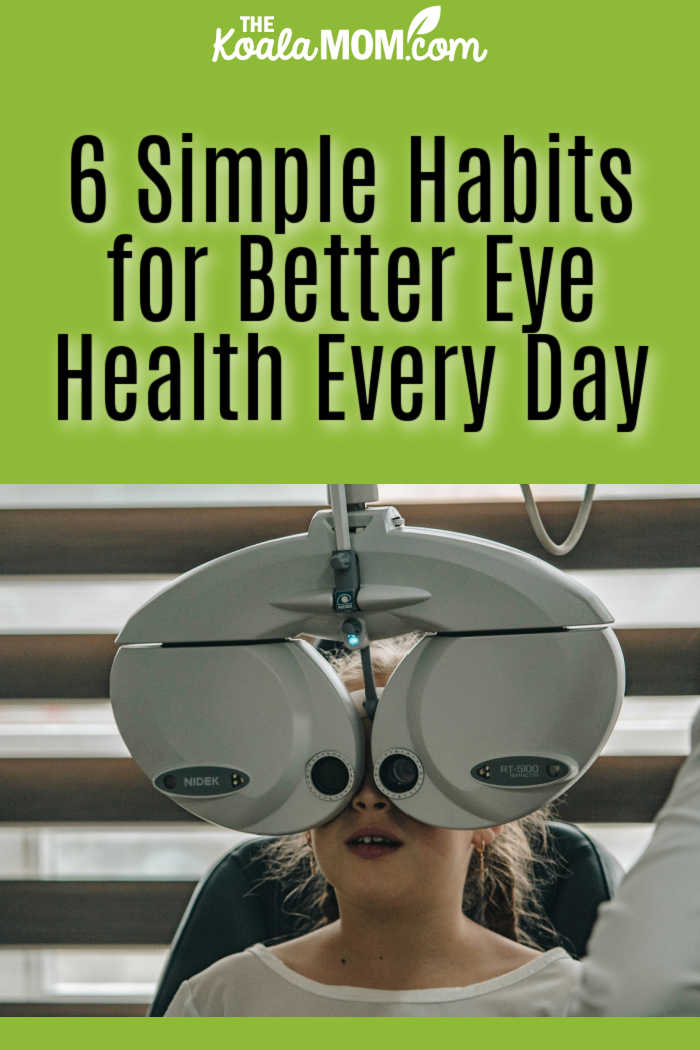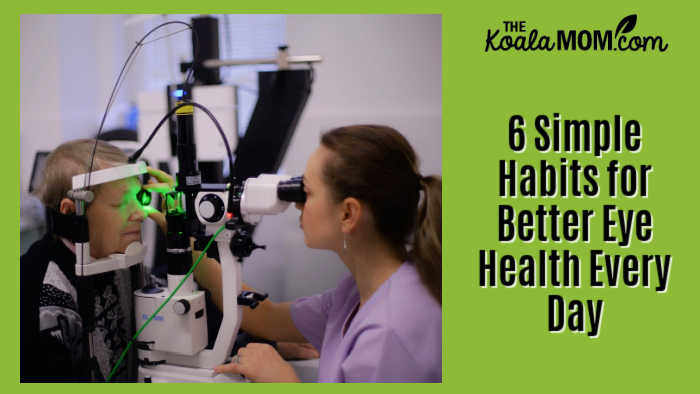Sound eye health is essential for a better quality of life, as our eyes are our windows to the world. With the growing use of digital devices, increasing exposure to harmful environmental factors, and a rise in age-related eye conditions, it’s more important to adopt habits supporting and protecting our vision. Fortunately, incorporating a few simple daily practices can go a long way in maintaining your eye health. Here are six habits you can follow every day for better eye health.

Practice the 20-20-20 Rule
With more people spending hours in front of computers, tablets, and smartphones, digital eye strain has become widespread. Prolonged screen time can lead to discomfort, dry eyes, blurred vision, and headaches. One effective way to combat this strain is by practicing the 20-20-20 rule. This allows your eyes to relax and reduces the fatigue caused by staring at a screen for extended periods. Set a reminder on your phone or computer to prompt you to take these daily breaks.
In addition to reducing digital eye strain, frequent breaks can help prevent neck, back, and shoulder pain that often accompanies long screen use. Alternatively, you can also use daytime glasses when using the computer. Explore the internet, where you may find blockbluelight.com, which will give you a good insight into your options. The glasses here can help block blue light emitted by gadgets and devices, reducing eye strain.
As our kids spend increasingly more time online as well, teach them to take breaks too. Too often, I see one of my kids hunched over their tablet, eyes focused on the screen just a few inches from their face. It’s a good idea to remind them to look around, to sit more comfortably when using their devices, and to stretch once in a while. I also try to encourage them to break their device time into smaller chunks—for example, practice duolingo and then take a break before moving on to typing practice.
Wear UV-Protective Sunglasses
The sun’s ultraviolet (UV) rays can damage your eyes, just as they can damage your skin. Wearing sunglasses that block UVA and UVB rays is one of the simplest and most effective ways to protect your eyes. When purchasing sunglasses, look for lenses that offer 100% UV protection. Polarized lenses reduce glare and make outdoor activities like driving or water sports more comfortable.
Wearing sunglasses is the number one way to prevent macular degeneration, which my grandfather suffered from. I finally bought myself a pair of prescription sunglasses recently and now make sure that I switch my glasses when I am out in bright sunlight. I definitely notice that my sunglasses are more comfortable for my eyes on sunny days.
Maintain a Balanced Diet for Eye Health
A healthy diet can prevent eye diseases. Spinach, kale, and other dark, leafy greens protect the retina from damage. Fatty fish like salmon, mackerel, and tuna help prevent dry eyes. Orange vegetables are high in beta-carotene, a precursor of vitamin A, essential for maintaining good night vision. Oranges, grapefruits, and citrus fruits protect your eyes from oxidative damage.
By incorporating these foods into your diet, you can nourish your eyes with the nutrients they need to stay healthy and function optimally.
Stay Hydrated to Keep Eyes Moist
When your body lacks sufficient fluids, your eyes may not produce enough tears to keep them adequately lubricated. This can be especially problematic for people who spend long hours in air-conditioned environments or wear contact lenses. Drinking enough water throughout the day helps your body produce the necessary moisture to keep your eyes lubricated and comfortable.
If you frequently experience dry eyes, consider using a humidifier in your home or office to add moisture to the air. Additionally, over-the-counter artificial tears can provide relief for mild dryness. Still, if dry eye symptoms persist, consult an eye care professional for further evaluation and treatment.
Get Regular Eye Exams
Even if you don’t have noticeable vision issues, routine check-ups with an eye care expert can help detect conditions like glaucoma, cataracts, and macular degeneration before they become more serious. Eye exams can also reveal underlying health conditions such as diabetes and high blood pressure, which can affect your eyes.
Adults with no known eye conditions are generally recommended to have an eye exam every two years. However, if you wear glasses, have a family history of eye disease, or are over 60, you may need more frequent check-ups—every one to two years or as your eye doctor recommends. Children should also have regular eye exams, mainly as their vision develops. Early detection of vision problems in children can help prevent learning difficulties and improve their overall quality of life.
Avoid Rubbing Your Eyes
Rubbing your eyes is a common reaction to tiredness or irritation, but it’s a habit that can do more harm than good. Your hands come into contact with countless surfaces throughout the day, and touching your eyes can transfer dirt, bacteria, and other particles to the sensitive tissues around them. Rubbing your eyes can also cause tiny blood vessels in the eye to burst, leading to redness or discomfort.
In some cases, excessive rubbing can contribute to the development of keratoconus, which causes the cornea to thin and change shape, affecting vision. To prevent irritation and infection, make it a habit to keep your hands away from your eyes. If you experience itching or discomfort, use a clean, damp cloth or eye drops to soothe the area instead of rubbing.

Caring for your eyes doesn’t have to be complicated, but it does require consistency. By adopting these six simple habits—practicing the 20-20-20 rule, wearing UV-protective sunglasses, maintaining a balanced diet, staying hydrated, getting regular eye exams, and avoiding eye rubbing—you can protect your vision and maintain better eye health every day. Your eyes are essential to your daily life, and taking small steps now can help ensure they remain healthy for years.

No Responses Yet